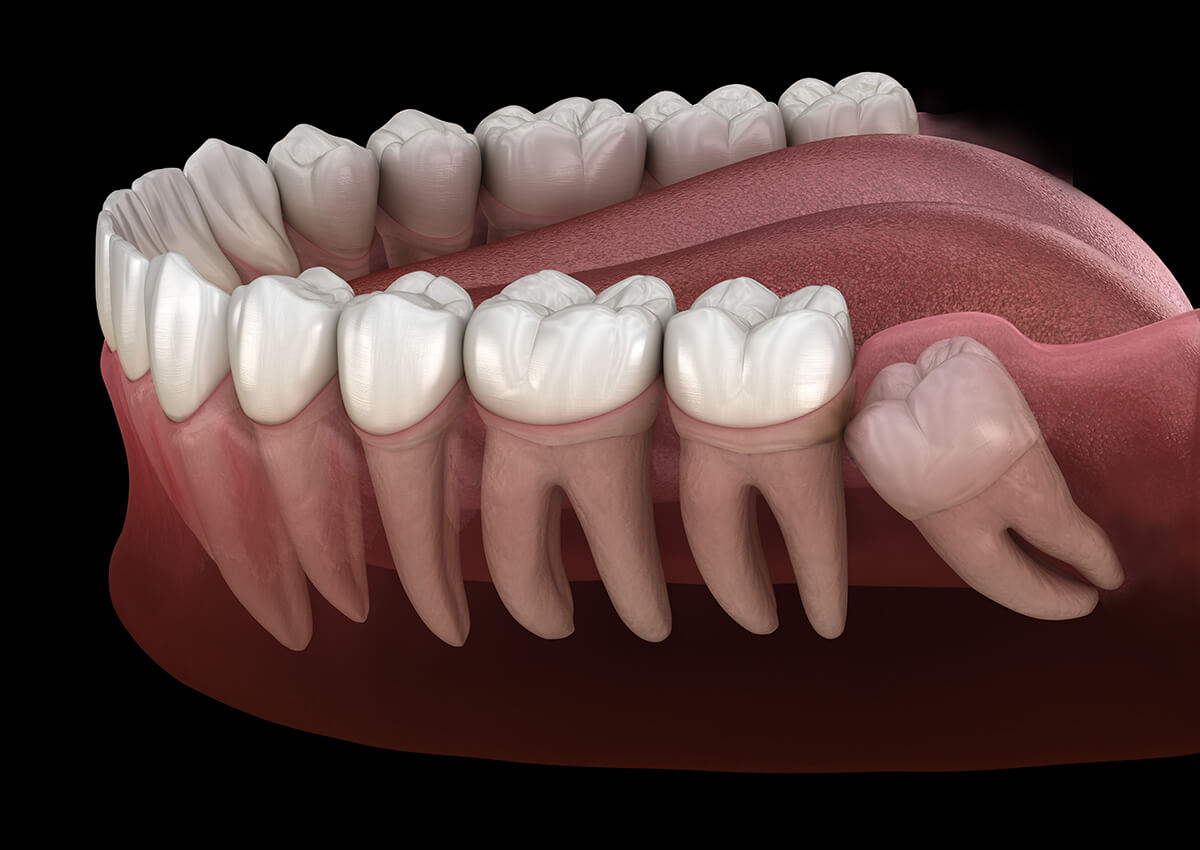Understanding Wisdom Teeth and Their Impact
What Are Wisdom Teeth?
Wisdom teeth, or third molars, are the last set of teeth to emerge, typically appearing between the ages of 17 and 25. They’re located at the very back of your mouth, with two on the top and two on the bottom. These teeth are often associated with various dental issues due to the limited space available in the jaw. While some people never experience problems, others may face significant discomfort and complications.
Common Issues Caused by Wisdom Teeth
When wisdom teeth don’t have enough room to grow properly, they can become impacted, leading to several issues:
- Pain and swelling: Impacted teeth can press against other teeth or the jawbone, causing discomfort.
- Infection: Partially erupted wisdom teeth can create pockets where bacteria thrive, leading to infections.
- Damage to nearby teeth: Pressure from impacted teeth can harm adjacent molars, potentially causing cavities or alignment issues.
Why Do Wisdom Teeth Need Removal?
Removing wisdom teeth is often necessary to prevent or address complications. Here are some reasons why extraction might be recommended:
- Preventing overcrowding: Extracting wisdom teeth can help maintain proper alignment of other teeth.
- Avoiding damage: Wisdom teeth can exert pressure on surrounding teeth, leading to potential damage.
- Reducing infection risk: By removing wisdom teeth, you lower the chance of infections and gum disease.
Removing wisdom teeth is a common procedure that can significantly improve oral health and prevent future dental issues. It’s important to consult with a dental professional to determine the best course of action for your specific situation.
Preparing for Wisdom Teeth Removal in Hamilton
Getting ready for wisdom teeth removal in Hamilton involves a few steps to ensure everything goes smoothly. Here’s what you need to know:
Initial Consultation and X-ray Evaluation
Before you even think about surgery, you’ll need to have an initial consultation. During this visit, your dentist will likely take an X-ray to get a clear picture of your wisdom teeth and their position. This helps in planning the surgery and deciding the best removal technique. It’s crucial to discuss any concerns or questions you have during this appointment.
Discussing Anesthesia Options
When it comes to anesthesia, you’ve got choices. Your dentist will talk to you about the different types available, like local anesthesia, sedation, or general anesthesia. The right choice depends on your comfort level and the complexity of the extraction. Choosing the right anesthesia is key to a pain-free experience.
Scheduling Your Surgery
Once you’ve sorted out the details, it’s time to schedule your surgery. Make sure to pick a date that allows you some downtime for recovery. Many people find it helpful to arrange for someone to drive them home after the procedure, as you might feel a bit groggy from the anesthesia.
Preparing for wisdom teeth removal isn’t just about the surgery itself. It’s about making sure you’re comfortable and informed every step of the way. From the initial consultation to the day of the surgery, each stage is important in ensuring a successful outcome.
The Wisdom Teeth Removal Procedure
Types of Anesthesia Used
When it comes to wisdom teeth removal, the choice of anesthesia is crucial for ensuring a comfortable experience. Patients typically have several options:
- Local Anesthesia: This numbs the specific area where the teeth will be removed. It’s ideal for straightforward extractions and allows you to stay awake and aware.
- Sedation Anesthesia: Administered through an IV line, this type keeps you in a semi-conscious state, often with no memory of the procedure.
- General Anesthesia: Used for more complex cases, this option renders you completely unconscious.
Your oral surgeon will help you decide which option is best based on your medical history and anxiety levels.
Step-by-Step Surgical Process
The actual removal of wisdom teeth involves a series of well-coordinated steps:
- Preparation: Before the surgery begins, the dentist will administer the chosen anesthesia and ensure you are comfortable.
- Incision: A small cut is made in the gum tissue to expose the tooth and bone.
- Extraction: The tooth is carefully removed. Sometimes, the tooth may need to be divided into smaller pieces for easier removal.
- Cleaning: The site is cleaned to remove any debris from the tooth or bone.
- Stitches: If necessary, stitches are placed to aid in healing, though some cases might not require them.
The procedure is generally quick, often completed within an hour, but varies depending on the complexity of the case.
Post-Surgery Care Instructions
Post-operative care is vital for a smooth recovery. Here’s what you should keep in mind:
- Pain Management: Over-the-counter pain relievers, or those prescribed by your dentist, can help manage discomfort.
- Swelling Reduction: Applying ice packs to the outside of the cheek can minimize swelling.
- Oral Hygiene: Rinse your mouth gently with saltwater after 24 hours, but avoid vigorous rinsing or spitting.
Healing takes time, so be patient with your body. Following your dentist’s instructions will help ensure a swift recovery.
It’s essential to follow these guidelines to prevent complications and promote healing. Make sure to attend any follow-up appointments to monitor your progress.
Recovery and Aftercare Tips
Managing Pain and Swelling
Right after your wisdom teeth surgery, you might feel like you’ve been through a bit of a battle. Swelling and pain are pretty common, but they don’t last forever. To ease the discomfort, use an ice pack on your face for 15 minutes on and off. Over-the-counter painkillers like ibuprofen can also be your best friend during this time. Just be sure to stick to the recommended dosage. If the pain feels like it’s getting worse instead of better, reach out to your dentist.
Dietary Recommendations Post-Surgery
Eating might seem like a challenge, but you don’t have to starve. Start with soft foods that won’t irritate your gums. Think yogurt, mashed potatoes, or smoothies. These are easy to swallow and won’t disturb the healing process. Avoid anything too hot, spicy, or crunchy. And definitely steer clear of straws! Sucking can dislodge the blood clot and lead to a painful condition called dry socket.
Signs of Complications to Watch For
Sometimes, things don’t go as planned. If you notice excessive bleeding, severe pain, or a weird taste in your mouth, it could be a sign of complications. Keep an eye out for fever or pus, as these might indicate an infection. If any of these happen, don’t wait—contact your oral surgeon right away.
“Recovering from wisdom teeth surgery is a process. Listen to your body, follow the care instructions, and you’ll be back to normal in no time.”
Choosing the Right Dental Clinic in Hamilton
Factors to Consider When Selecting a Clinic
Choosing a dentist in Hamilton can feel like a daunting task, but it doesn’t have to be. Start by considering the clinic’s reputation and reviews. A highly-rated clinic with positive feedback from patients is a good sign. Next, look at the range of services they offer. Do they provide emergency dentist services in Hamilton or specialized treatments like teeth whitening in Hamilton or Invisalign? Also, check their operating hours and location to ensure they fit into your schedule.
Questions to Ask Your Oral Surgeon
Before committing to a clinic, it’s wise to ask a few questions. Inquire about the dentist’s experience with wisdom teeth removal, and whether they handle emergency cases. Ask about the types of anesthesia available, and how they manage post-surgery care. It’s also helpful to know if they offer other services like dental implants or root canal treatments in Hamilton, in case you need them later.
Benefits of Local Expertise in Hamilton
Opting for a local clinic has its perks. Being close to home means you can easily access follow-up appointments and emergency care if needed. Local clinics often have a better understanding of community needs and expectations. Plus, they might offer personalized care and familiarity that larger chains can’t match. Whether you’re considering teeth whitening in Hamilton or a more complex procedure, local expertise can make a big difference.
Choosing the right dental clinic is about more than just convenience; it’s about finding a place where you feel comfortable and confident in the care you receive. This decision can impact not just your immediate dental needs but your long-term oral health as well. So take your time, do your research, and don’t hesitate to ask questions.
Potential Risks and Complications
Understanding Impacted Wisdom Teeth
Impacted wisdom teeth can be a real pain, literally and figuratively. They occur when these third molars don’t have enough room to emerge or develop normally. This can lead to a bunch of issues like pain, infection, and even damage to other teeth. Imagine your wisdom tooth trying to push its way through, but it’s stuck against another tooth or your jawbone. Ouch! It’s not just uncomfortable; it can also mess up the alignment of your other teeth.
Possible Surgical Complications
Getting your wisdom teeth out isn’t always a walk in the park. While most people sail through the procedure, there are a few things that can go sideways. Dry socket is probably the most talked-about issue—it’s when the blood clot at the site of the extraction fails to develop or gets dislodged, leaving bone and nerves exposed. Then there’s the risk of infection, which can happen if bacteria find their way into the extraction site. Some folks might even experience some nerve damage, leading to numbness in the tongue, lips, or chin.
When to Seek Emergency Care
After your wisdom teeth are removed, you’ll want to keep an eye out for any signs that something’s not quite right. If you notice excessive bleeding, severe pain that doesn’t go away with medication, or swelling that gets worse instead of better, it’s time to call your dentist. Other red flags include fever, pus coming from the extraction site, or difficulty swallowing or breathing. Don’t ignore these symptoms—they could mean there’s a serious problem that needs immediate attention.
Remember, while complications from wisdom teeth removal are rare, being informed and vigilant can help you catch any issues early and ensure a smoother recovery.
Benefits of Wisdom Teeth Removal
Improved Oral Hygiene
Wisdom teeth, tucked away at the back of your mouth, are notoriously hard to clean. This makes them a breeding ground for bacteria and plaque. Removing these tricky teeth can significantly enhance your oral hygiene. Once they’re gone, you’ll find it easier to brush and floss, reducing the risk of cavities and gum disease.
Prevention of Future Dental Issues
Keeping your wisdom teeth can lead to overcrowding, which might push your other teeth out of alignment. This misalignment can mess with your bite and even cause jaw pain. By removing wisdom teeth early, you can prevent these potential problems and save yourself from more complicated dental work down the line.
Enhanced Overall Health
Did you know that oral health is linked to your overall health? Impacted or infected wisdom teeth can lead to systemic infections if left untreated. Timely removal of these teeth can help you avoid such complications, thus promoting better health overall.
Getting your wisdom teeth removed might seem daunting, but the long-term benefits far outweigh the temporary discomfort. It’s a step towards ensuring a healthier mouth and, by extension, a healthier you.
Wrapping Up: Your Wisdom Teeth Journey in Hamilton
So, there you have it. Getting your wisdom teeth out in Hamilton doesn’t have to be a big deal. Sure, it might sound a bit intimidating at first, but with the right info and a good dentist, you’re in safe hands. Remember, it’s all about keeping your mouth healthy and avoiding those pesky problems down the road. Whether it’s a quick chat with a specialist or a full-on extraction, knowing what to expect makes all the difference. Plus, with flexible hours and free parking, it’s easier than ever to fit into your schedule. So, if you’re feeling that wisdom tooth pain or just want to get ahead of any issues, don’t wait. Reach out to a local dentist and get the ball rolling. Your future self will thank you!









